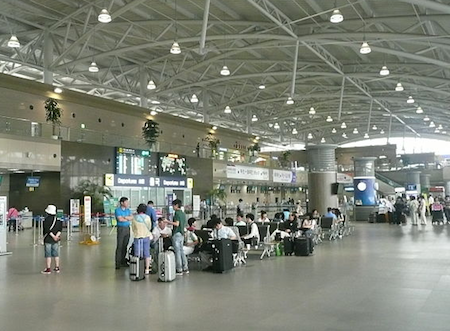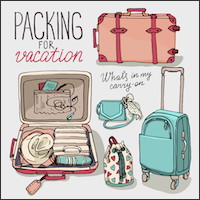One Way Travel Tips
No Return - Your Ticket to Freedom

Whether You're Headed Out For a Month or a Lifetime
A Traveler's Mantra
One way travel brings to mind one of my favorite quotes (there's some question about who authored it but either J.P. Morgan or Thomas Carlyle...)
"Go as far as you can see, and then you can see farther"
The definition of one way travel is going on a trip without purchasing a return ticket.
Maybe that means that you'll be staying long term or that you haven't yet decided where you'll go next. Many one way travelers move around and then depart from a new destination or return to their starting point via a different mode of transportation.
In any case here are a few points to consider before you head out.
One Way Travel Tips
Proof of Onward Travel
This is a biggie.
One of the most asked questions regarding one way travel is "Do I need to show proof that I'll move on?"
And the answer is "Sometimes."
Most of the time there's no problem and you won't even be asked about your intended itinerary when you check in for your flight. Occasionally, however, you'll be asked for proof that you plan to leave the country within the allowable period.
A non-return ticket is more likely to trigger questions about your future movements.

If you're going to run into trouble it's most likely to happen at your
point of departure (the check-in desk at the airport) than once you've
arrived at your location. That's because the airline is responsible for
your return travel if they fly you to a country where you are denied entry. Sometimes the airline is fined a hefty fee as well.
Airlines obviously want to avoid the consequences of a passenger being denied entry into a country so if you're traveling on a one way ticket they may want proof that you
don't have an intention to overstay your welcome and that you can satisfy authorities at your destination that your plans include an exit.
This proof can be in a number of forms, most commonly a ticket that would take you out of the country via air, rail, bus or ship but there are other things that would indicate to them that you're not likely to stay.
An acceptance letter for school or a job back home or in another country or a travel itinerary that indicates where you're planning to go and when (sometimes you can pen your own). A busy passport with lots of stamps and movement can be helpful. It shows a history of traveling in and out of countries within expected timelines.
Arrive Early
Be prepared for the possibility that you may need to produce more proof.
Always leave yourself plenty of time at the airport to iron out any glitches that arise.
You may be required to buy a ticket out of the country before they'll allow you to board. You don't have to go back the way you came, but you have to go somewhere outside of the country. If you must purchase a ticket and you really don't know where you want to go next, choose one that's fully refundable and cash it in the next day or select the cheapest destination that takes you out of the country and forfeit the money if you choose to go somewhere else when your time is up.
Flashpacking

Yes, it's a thing. Flashpackers pack their electronics and a credit card along with a few essentials and off they go.
There are lots of ways to go about your one way journey. Flashpackers usually carry a single bag (often a backpack) and have a short packing list. It's the ultimate in packing light and their nightly stays require accommodations that offer plug-in's for recharging and downloading their electronic and computer gear.
Their luggage holds a few articles of clothing and toiletries but most importantly a laptop, camera, smart phone and other devices that keep them connected in a variety of ways.
Some work or blog from their laptop, others are freelance writers, photographers or journalists that go wherever the trail leads.
Often referred to as luxury backpackers, flashpackers combine the freedom of backpacking with an upscale lifestyle. They tend to pack light (usually just a backpack) and carry electronic devices for working, uploading images, communicating with family and researching where they'll go next.
House or Pet Sitting
Or try house sitting your way around the planet. Singles, couples and even families are getting their travel on by exchanging the care of a home and sometimes pets for a fully furnished and equipped home in which to stay. Some gigs last for a few days and others are long term
Once you've traveled, really traveled, you'll never be exactly the same person as you were when you began. That's one of the points of leaving ... to see the world through your own eyes and evolve as a human being. It makes sense to make future decisions from your brand new perspective.
Packing Tips For One Way Travel
Packing List
- See Complete Packing List
- Universal travel adapter
- RFID wallet
- Stowable day pack
- Collapsible water bottle
- Journal
- Unlocked smart phone
- Electronics and chargers
- Sunglasses
- Choose Bags Wisely - Luggage should securely transport your belongings without adding a lot of weight or bulk itself. Avoid heavy bags with decorative aspects that add nothing to their usability.
- Carry On Size - Carry on luggage size and weight restrictions vary from carrier to carrier. Check every airline you'll use and choose your bag size to comply with the most restrictive carrier.
- Only The Basics - Pack only the most basic items if you'll move from climate to climate. When you need something for a particular place that you won't need again, buy it locally and donate it before you leave. Excess baggage and extra seasonal clothing you no longer need can also be shipped home.
- An iPad, Notebook or a Smart Phone will help to keep you informed, connected and organized. Find places to stay, events, restaurants, flight, rail or sea bound tickets. Keep banking and bills up to date. Buy an UNLOCKED smart phone or have the company you bought it from unlock it. Get local sim cards at your new destinations. When I called my phone company to ask them to unlock the phone (which was paid for by this time) they wanted to charge me $35.00 to unlock it. I explained to them that I was a long time customer of theirs and I thought it was a bit money grabby to ask me to pay them to remove a feature that had been put in place for their benefit. They waived the fee.
- Keep Your Bank Account Safe - Set up two online bank accounts with debit cards. Account number 1 is for keeping the bulk of your funds and is only accessed online to transfer money into account 2, the debit card is kept with your passport and is only for emergencies. Account number 2 is the one from which you'll make withdrawls. Transfer money into this account as needed when you're about to withdraw (enough to cover bank charges and fluctuations in currency values). The card for Account number 2 is the only one that is used at the ATM machines. This way if some unscrupulous skimmer gets access to number 2 there's a limited amount of money in the account and you'll be alerted that there's something amiss. Because you've never accessed an ATM with account number 1 the bulk of your money is safe and only the limited funds in account number 2 are at risk.
- Paperwork and Documentation - Make sure all of the details are attended to. Some countries require your passport to have quite a bit of room left before expiry (6 months after your departure date is not uncommon). Avoid long term plans on a passport that will expire within the next year.
The Benefits of One Way Travel
- Make Plans On-The-Go - Stay for a week or a year (depending on international restrictions). You may love your destination ... or not. The only way you'll know is to go and decide for yourself. A loosely based itinerary allows you to make changes to your agenda, destinations, accommodations and modes of travel and gives you the freedom to take advantage of opportunities that arise, or simply to change your mind and move on.
- Mind Expanding - Travel opens your mind and makes you more empathetic toward humanity. Your perspective of the world broadens as does the ability to understand cultures and approaches to living that would once have completely mystified you.
- Options Stay Open - If you are suddenly presented with an opportunity to develop or improve on a language, craft or skill, a one way travel itinerary allows you to adapt your schedule when opportunities arise.
- Confidence Builder - Negotiating your way around the country or the planet builds a confidence that stays with you through your lifetime. The kind of self possession that makes you attractive to employers and interesting to people in general.
- Get Last Minute Specials - Just found a super deal on a side trip? No problem. Since you're not tied down to an itinerary you can change plans instantly and book that sailboat charter or train trip ... or whatever floats your boat.









